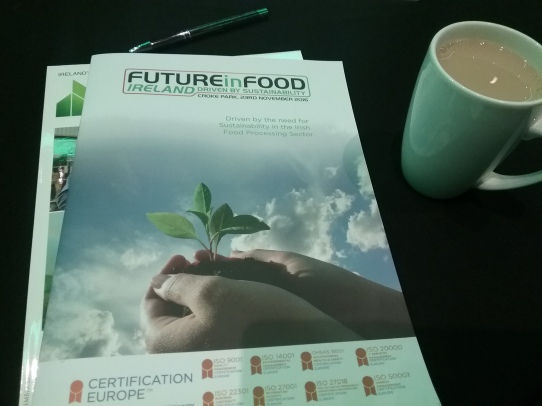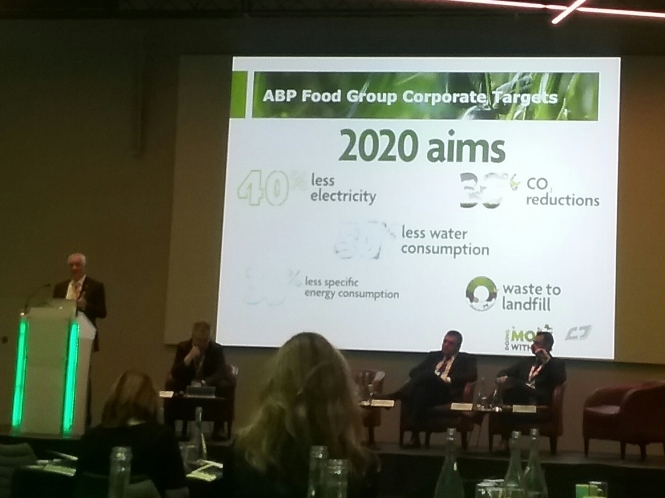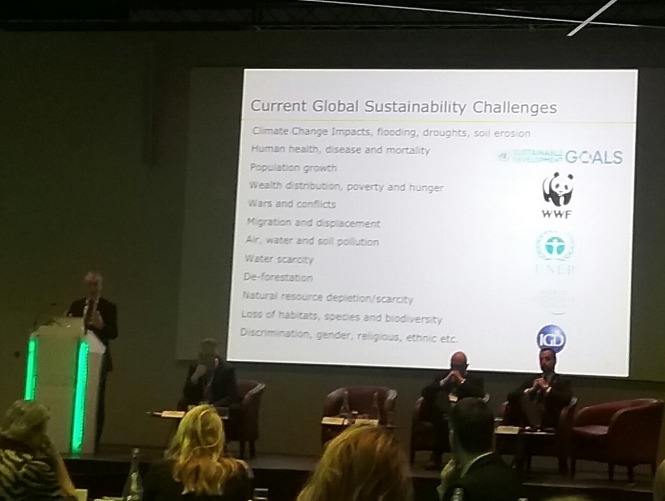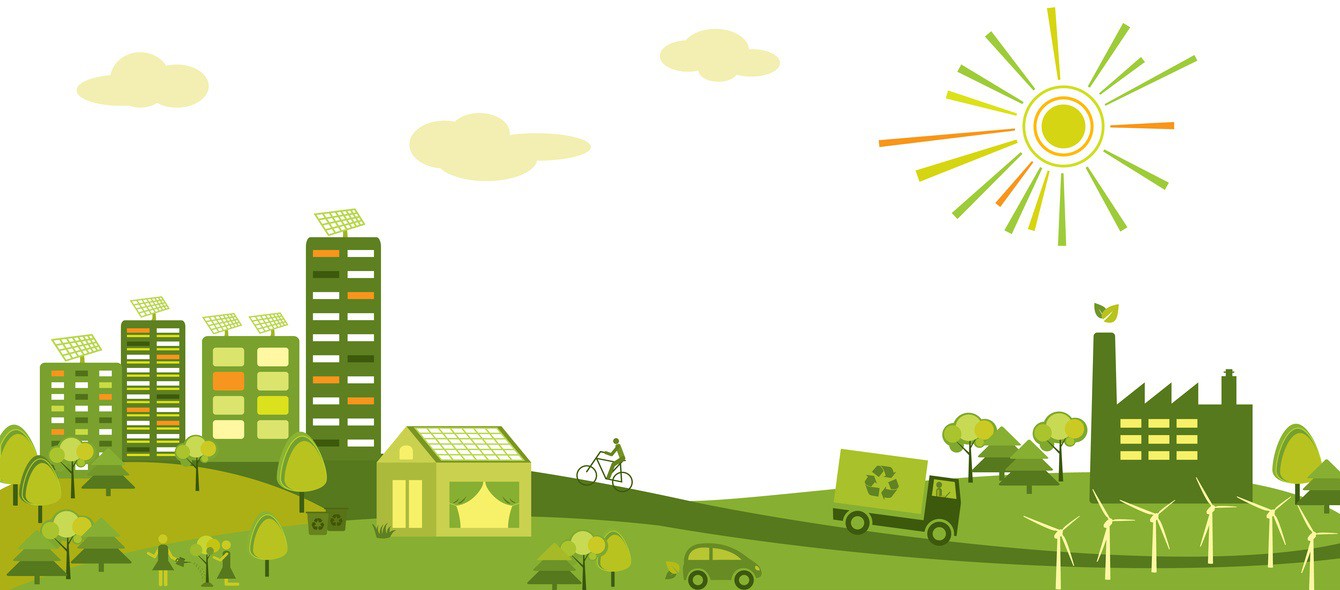
Sustainability is becoming increasingly important in the Food and Agri. industry, a sector which in Ireland accounts for 33% of annual GHG emissions. Future in Food is an annual conference exploring the latest developments in the Irish food and drink industry and featuring presentations on best practice from Irish food producers of all types and sizes. In 2016 the conference theme was sustainability.
The event opened with an address by Michael Creed, Minister for Agriculture, Food and Marine. The Minister began by stating that sustainability has never been more important. He suggested that it is now clear that energy efficiency and environmental management is linked to profitability.
He praised Bord Bia’s Origin Green marketing initiative, observing that it “offers sustainability branding for the industry; marks us 0ut as a country that takes this seriously”. He has noticed when attending trade fairs in Asia that marketers are interested in the sustainability of the food system. The Minister stressed the value of sharing information and pooling experiences, and noted that Origin Green recognises that companies are on “different stages of their sustainability journey”.
He also spoke of Brexit, citing it as the single biggest challenge for the agri business sector in Ireland and highlighting the volume of our exports to the UK.

Minister Michael Creed speaks at Future in Food
The rest of the day consisted of a number of short presentations from individuals in the industry and a brief summary of each talk follows.
9.30am – Richard Alexander – Industrial Manager – Calor Ireland
Richard explained how Calor is bringing Biopropane bioLPG fuel – a byproduct of biodiesel manufacturing – into Ireland in partnership with Swiss company Neste. He noted that use of biofuel can result in up to 80% GHG emission reductions.
09.55am – Nigel McGuire – Director of Development – McDonalds Restaurants
After an outline of McDonald’s approach to sustainability, Nigel focused on meat production, and outlined some striking facts on Irish beef. Ireland is the largest producer of beef in the Northern hemisphere, and McDonalds is the largest single purchaser of that beef. 1 of every 5 burgers sold by McDonalds in Europe is from Ireland.
He also spoke of the targets the company has set under the Origin Green program, such as 100% of fleet by 2017 to be fueled by biodiesel from waste oil from its restaurants. He suggested that companies should not have a sustainability department, there should instead be a “culture of sustainability”.
Nigel then presented a video in which a farmer supported by McDonalds noted that the company encourages the ‘3 Es’ – food produced in an ethical, environmentally friendly and economically viable manner.
10.20am – John Durkan – Sustainability Manager – ABP Food Grp
John’s brief was what comes next after “doing more with less”. The sustainability program at ABP, Europe’s largest red meat processor, started off as a resource efficiency programme, but the company is now aiming to go beyond this to reduce total waste and food losses.
John also presented some useful statistics on water use in agriculture, noting that it takes 16,000 litres of water to produce a kilo of beef, that 92% of all the world’s water is used in agriculture, and that 40% of the world’s population are water stressed. This is an area of big focus for ABP and the company has received the Gold standard from the European water stewardship programme.
John presented ABP’s 2020 targets (see below) and noted that the company has already achieved zero waste to landfill target. He explained that they have made their facilities carbon neutral through using biodiesel as fuel.

John Durkan of ABP Food Group
The company is also working with farms on a number of interesting initiatives, such as working with Genus to develop different breeds and strains of animals with better conversion ratios to beef.
In reponse to a question from the audience he suggested that we can meet the EU emissions targets through efficiency and significant investment in new technology. Measuring and monitoring was his mantra and he cited Origin Green as helpful in that regard.
11.15am – Eleanor Meade – Operations Manager – Meade Potato Company
Eleanor described how the Meade Potato Company used Bord Bia’s Origin Green program to engage with sustainability, suggesting that the progam has allowed them to formalise what they’re doing and helps them to set objectives. She observed that “Origin Green reformalises the process of what we do, challenges us to do more and helps us focus in on the key areas”.
She stressed that sustainability involves the whole supply chain, noting that lot of fruit product has to be imported so they are always thinking about carbon footprint. Eleanor cautioned that decisions sometimes “boil back to money – how much does this cost and is there a benefit for everyone involved?” However, she clarified that “if we spend a bit more initially we know we’ll get it back in the long term”.
She also discussed the importance of using the whole crop, and the issue of “visually impaired potatoes”. These are processed into chips, used as stock feed and donated through CrossCare (http://www.crosscarefoodbank.ie/). Eleanor highlighted the “Feeding the 5k” event in 2012 in which Meade Potatoes participanted, where 5,000 people in Dublin and Cork were given dinner made with visually impaired food (http://www.feeding5kdublin.org/). She also noted that retailers are now making an effort to market wonky fruit and veg, citing Woolworth’s (Australia) “Odd bunch” initiative (https://www.woolworths.com.au/Shop/Discover/our-brands/the-odd-bunch)

“Wonky fruit and veg are gaining popularity” – the Odd Bunch
11.40am – Majella Kelleher – Energy Demand Manager – SEAI
Majella outlined SEAI business supports, with a particular focus on their EXEED certification programme for buildings. This helps organisations to build in energy efficiency at any point in the building process but particularly at the design stage when, she explained, it is most important.
12.00am – Keith Bonner – Sustainability Director – Irish Fish Canners
Irish Fish Canners packs Irish mackeral and herring for international markets. Keith began with the story of how they recently changed the size of their cans, helping them to reduce energy use and emissions. It is interesting to note that it took two and a half years to change the can size, illustrating the complexity of making product changes for sustainability. This helped them to reduce their carbon footprint by 20%. On the company’s Origin Green certification he commented that “at the start [of Origin Green] you think its a mountain to climb but once you start it makes you better”. This was echoed by a number of the SMEs presenting during the day.
12.20pm – Una Fitzgibbon – Director of Marketing Services – Origin Green
Úna took us through the development of the Origin Green program and Bord Bia’s plans for the future. She began by arguing that “the future of food is sustainability” and “embracing sustainability has assisted the growth of the industry”. She outlined her reasons to engage with sustainability in the slide below:

Una Fitzgibbon of Bord Bia outlines why business should engage with sustainability
Úna also explained that trade customers in the industry see sustainability as important to their busines, and Origin Green allows Ireland to work with these organisations. She suggested that the programme can be implemented in Ireland because the whole industry will work together in a small country.
Úna described Origin Green as a “platform for communicating the sustainability credentials of the industry”. She said that these credentials are “currency, in demand from our trade customers. And in the future as millenials come down the line [sustainability] will be more in demand”. Bord Bia has evidence of trade customers extending contracts due to Origin Green and surveys at international trade fairs have estimated 30% awareness of Origin Green.
The program is currently being piloted out through services e.g. supermarkets and restaurants, and will soon move on to distribution. She noted that health and wellness is important to Origin Green and will be an emphasis going forward.
The long-term goal of Origin Green is to “build a sustainable food demonstration in Ireland”. Úna stated that “nation branding” is uniquely important to a small country like Ireland. Origin Green is “the opportunity to brand the country for its green credentials, not just its green image, through the delivery of real, green, evidence based data“.
1.45pm – John Curran – Head of Sustainability – Musgrave Group
Retail group Musgraves is the largest private sector employer in Ireland, employing over 35,000 people. John Curran explained how the company’s existing values as a family business align with sustainability e.g. taking a long-term view. The purpose of the business is to maintain it for future generations, which echoes the Brundtland definition of SD. He explained that for Musgraves, sustainable development requires that we see the world as a system; “things that happen in one time in one area have an impact on another time and another area”.
It was good to see a business engaging with the real issues of sustainability, as illustrated by this slide John presented.

John Curran, Musgrave Group
When revising their sustainability strategy in 2015 Musgraves looked to the SDGs and decided to focus on 9 goals, as illustrated in the figure below.
Musgrave Group’s strategy aligned to UN Sustainable Development Goals
2.10pm – Richard Keagan – FIEI Manager – Enterprise Ireland
Dr Keegan talked about lean management, which he dubbed “Operation Transformation for business”. He took us through Enterprise Ireland’s lean business offers (https://www.enterprise-ireland.com/en/productivity/lean-business-offer/).
2.30am – Mark Haughey – Sustainability Manager – Coca Cola (HBC)
Mark explained Coke’s sustainability policy and highlighted what the company has done in the areas of water, carbon and waste. With the help of the slide below he illustrated how the company has achieved zero waste in its Lisburn plant.

Mark Haughey from Coca-Cola
3.25pm – James Cherry – Grp. Environmental Manager – Greencore
James discussed energy management at Greencore, which he explained was catalysed by the UK ESOS initiative, which requires organisations to perform an energy audit but, oddly not to act on any of the issues identified. Starting from scratch the business has focused first on short term energy efficiency measures and will look at more long term renewable energy projects in the future.
3.45pm – Patrick Rooney – Managing Director – Derrycamma Farm
Derrycamma farm is a tillage farm producing rape seed oil. Patrick had some interesting insight into joining Origin Green as a small company. He noted that the key was tailoring the programme to fit the business. He also benefited from the help of LEAF in the UK, which helped Derrycamma focus on soil protection.
4.10pm – Birgitta Hedin-Curtin – Founder – Burren Smokehouse
The Burren Smokehouse is now a food tourism business as well as a food producer, attracting 45,000 visitors every year to its visitors centre. Birgitta noted that when they first heard of Origin Green they thought “do we need this, are we not sustainable already? But then we realised that this was an opportunity”. They also found the Burren Code of Practice helpful when applying for Origin Green certification. She suggested that when people are on holidays is the best time to get a sustainability message across to them.
The Burren
